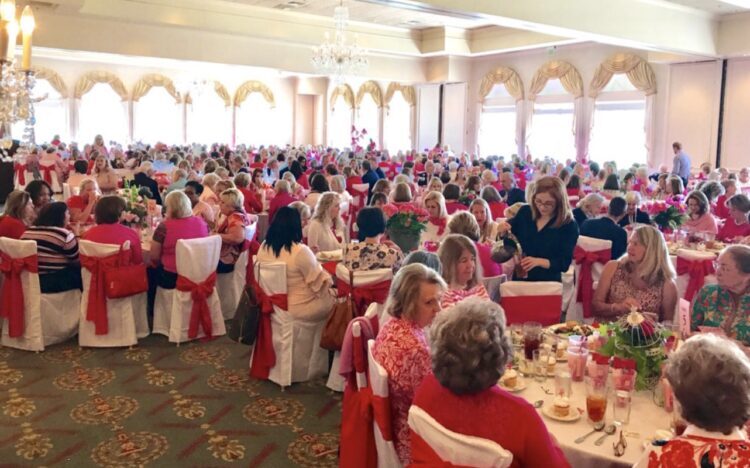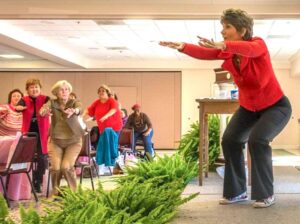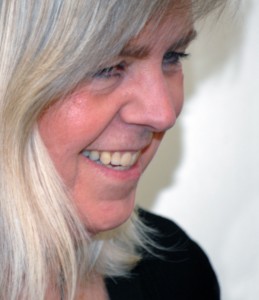
Vol. 21, Issue 3, Feb. 10, 2023
It’s been 19 years since the American Heart Association launched their first Go Red for Women® initiative. In the beginning it was all about wearing red to draw attention to women’s heart health — as differentiated from men’s heart health. Women gathered at AHA affiliated Go Red for Women luncheons across the US, where they learned about the signs of heart attacks that are unique to women and heart healthy habits to prevent heart issues. It was a great fit for the Speak Well Being Group. As specialists in women’s health, we offered excellent speakers, both heart disease survivors and healthy lifestyle experts, for those luncheons all around the country.
 Today Go Red has grown into a comprehensive platform designed to increase women’s heart health awareness and serve as a catalyst for change to improve the lives of women globally.
Today Go Red has grown into a comprehensive platform designed to increase women’s heart health awareness and serve as a catalyst for change to improve the lives of women globally.
At the very first Go Red for Women luncheon that I attended here in Portland, Oregon, the president (at the time) of the AHA Portland Metro Board of Directors, Sandra Lewis, MD, shared a revealing retrospective with the audience. We learned that the first women’s heart health event in the country had been held in 1964 here in Portland. Ten thousand women attended, and leading up to the event, news reports had warned of a huge traffic jam surrounding the venue. The speaker was Dr. Paul Dudley White, the renowned “father of cardiology.”
What drew enough women in 1964 to tie up city traffic for miles around? The topic was “Hearts and Husbands”, and it covered the role of the wife in her husband’s heart health. Have we come a long way, baby, or what?!?

Of course, it’s all well and good to be concerned about the health of other members of our families, but women have put others welfare in front of their own for far too long. The Go Red campaign has been successful in many areas — raising awareness and empowering women to take action for their own well being — to know their numbers, recognize the symptoms of heart attack, and make healthy lifestyle changes — as well as raising money for research.
Still, there’s more to be done, as heart disease remains the number 1 killer of women, causing 1 in 3 deaths each year.
The simple truth is that many cardiovascular diseases can still be prevented with education and healthy lifestyle habits. We can help with that. The Speak Well Being Group still offers our clients both heart disease survivors, who share their stories and advice, and lifestyle experts, who guide your audience onto the path to lifesaving and life-affirming habits of eating and moving.

You can search among speakers for heart health events here in my web pages, or feel free to contact me and I’ll be happy to help guide you.
Meantime, listen to your body; it may be trying to tell you something. I believe many of our readers have heard the following information regarding heart attack symptoms in women. But maybe your friends have not? I think it bears repeating.
My husband and I were recently visiting friends for the weekend when they received a call that one of their dear female friends (in her 70’s) had been rushed to the hospital with a heart attack. As we learned later in the weekend, she had had symptoms leading up to the event, but hadn’t recognized them as heart attack symptoms and had brushed them off. Fortunately, she got prompt medical attention, received a stent and survived. As her very upset, and concerned husband shared with all of us, they will be implementing lifestyle changes in their lives in the coming months.
Paying attention to the warning signs could save your life. The following information is from the American Heart Association.
The American Heart Association
Heart Attack Symptoms in Women
If you have any of these signs, call 911 and get to a hospital right away.
- Uncomfortable pressure, squeezing, fullness or pain in the center of your chest. It lasts more than a few minutes, or it goes away and comes back.
- Pain or discomfort in one or both arms, the back, neck, jaw, or stomach.
- Shortness of breath with or without chest discomfort.
- Other signs such as breaking out in a cold sweat, nausea, or lightheadedness.
- As with men, women’s most common heart attack symptom is chest pain or discomfort. But women may experience other symptoms that are typically less associated in men with heart attack, such as shortness of breath, nausea/vomiting and back or jaw pain.
We’ve all seen the movie scenes where a man gasps, clutches his chest, and falls to the ground. In reality, a heart attack victim could just as easily be a woman, and the scene may not be that dramatic.
Even when the signs are subtle, the consequences can be deadly, especially if the person doesn’t get help right away.
“I thought I had the flu”
Even though heart disease is the No. 1 killer of women in the United States, women often chalk up the symptoms to less life-threatening conditions such as acid reflux, the flu or normal aging.
A heart attack strikes someone about every 40 seconds. It occurs when blood flow that brings oxygen to the heart muscle is severely reduced or cut off completely. This happens because the arteries that supply the heart with blood can slowly narrow from a buildup of fat, cholesterol, and other substances that are called plaque.
Many women think the signs of a heart attack are unmistakable — but they can be subtler and sometimes confusing.
Some women experiencing a heart attack describe upper back pressure that feels like squeezing or a rope being tied around them. Dizziness, lightheadedness, or fainting are other symptoms.
Take care of yourself
Heart disease can be preventable. You can click here to learn your risks, and which risks you can change.
Meantime, be sure to:
- Schedule an appointment with your health care professional to learn your risk for heart disease.

Zonya Foco, RD, health and nutrition speaker gets audience up and moving with quick and easy squats. - Quit smoking. Just one year after you quit, you’ll cut your risk of coronary heart disease by 50%.
- Aim for at least 150 minutes a week of moderate-intensity aerobic activity (such as brisk walking) or 75 minutes of vigorous aerobic activity (such as jogging), or a combination of both, preferably spread throughout the week. It’s also good to include moderate- to high-intensity muscle-strengthening activity (such as resistance or weight training) at least twice a week.
- Modify your family’s diet if needed. Check out these healthy cooking tips. You’ll learn smart substitutions, healthy snacking ideas, and better prep methods.
It Could Happen to You or A Dear Friend
If you’ve been with us for a while, you may remember the story I wrote in July 2019 about my dear friend, Wendy Mitchell, “Pacemaker Surprise on the Fourth of July.” Wendy’s experience is an example of the importance of paying attention to symptoms and taking care of yourself. Wendy speaks from experience:
“Women’s heart attack symptoms are different than men. Men’s are straightforward but ours are more complex. And the problem is that women tend to ignore what doesn’t standout. We write off such symptoms as normal fatigue. Women see themselves as run-down all the time. So what does ‘run-down’ really mean? Early symptoms are easy to dismiss.”
As noted in the title of that story, Wendy’s issue turned out to be electrical rather than circulatory, and it was handled with the insertion of a pacemaker. Nonetheless, it was harrowing for her.
“My word from this experience,” Wendy said, “is precious — how important it is to protect our precious hearts. As women, we don’t think of ourselves enough. Instead, we think we need to be taking care of everybody else.”
You can learn from the entire story here.
Wendy’s experience is an example of why we need to keep educating women about heart health. It could save your life or the life of someone you love. Until next time, take care of your heart health – for your well being and those you love.
Yours truly,
Barbara

For Your Well Being is published with the intention of bringing you insider speaker reports, exclusive stories about special events around the country, meeting planner tips, and fun stuff from the worlds of health and well being. Be well and be in the know!
The Speak Well Being Group is a specialized speakers bureau, focusing on health and wellness for all types of organizations that want to foster health and well being for their employees, members, clients, and in their communities.
Our speakers are hand-selected. They are not only experts in their fields; they connect with their audiences while bringing them life-changing information, smiles of recognition, and ultimately a sense of well being and hope.
Finding the perfect keynote speaker for your special event or conference is my personal passion, not just once, but year after year. It brings me great joy to know that your audience was delighted and moved by the speaker we selected together. I’m committed to making the process easy, pleasant and fun.
